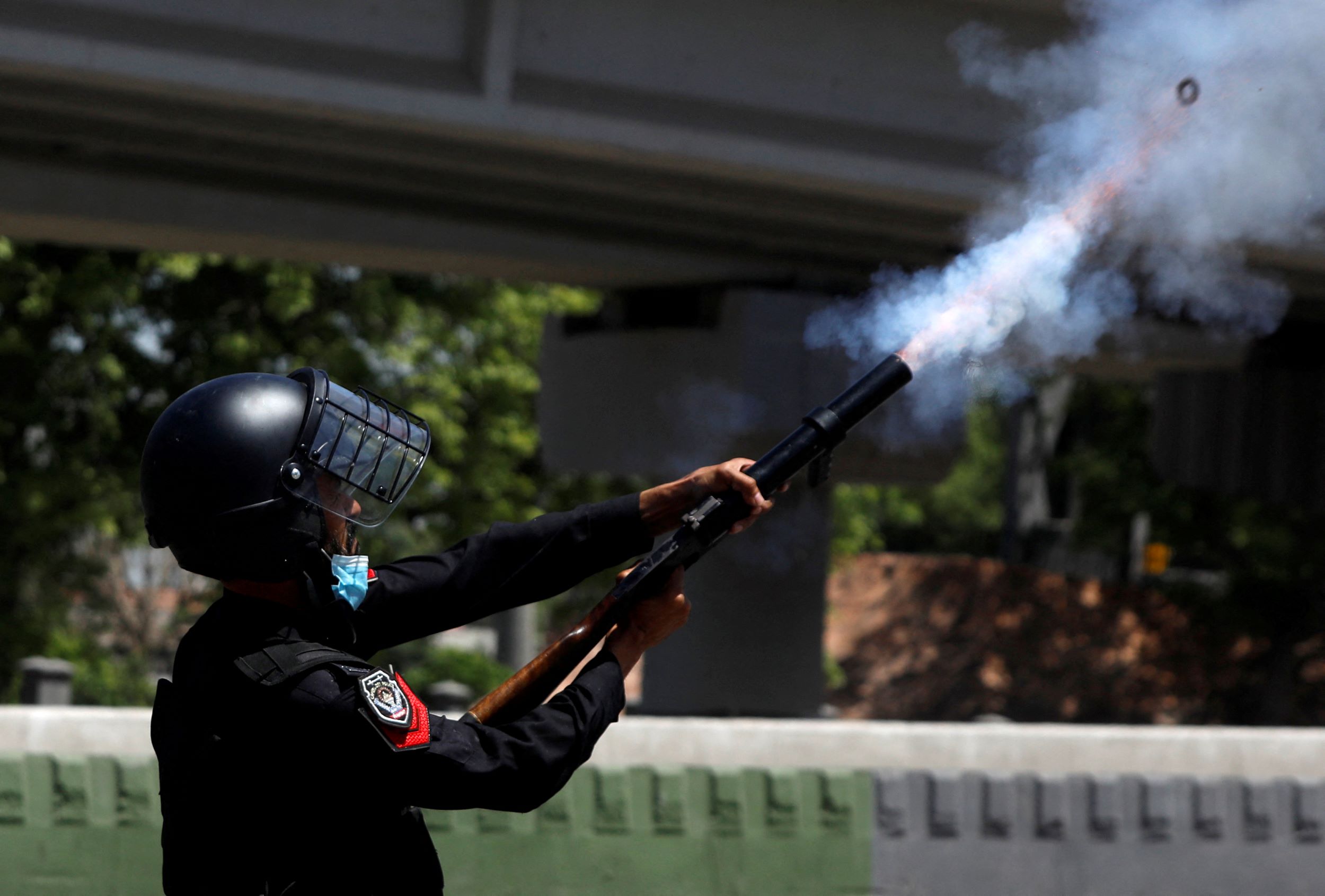Following the arrest of former Prime Minister Imran Khan, violence has erupted across Pakistan. For journalists, it is like reporting from the centre of a storm
The last time I visited Pakistan, it was just days before the momentous events of April 10 last year - a period of great significance in the country's political history, as Imran Khan, the then-sitting Prime Minister, was ousted from his position through a vote of no-confidence in parliament. Though tensions ran high and clashes broke out between protesters and the police, the situation did not escalate into complete chaos and remained relatively calm.
I couldn’t imagine things getting any worse. But a year later, it was nothing compared to what was to come.
In the early afternoon of May 9 this year, a few months into my stay in Lahore, the country's sense of normalcy was shaken, as my phone suddenly sprang to life with a collection of messages from several journalism WhatsApp groups I had joined. The breaking news notifications, speculations and concerns began flooding in around 2.30 pm, informing us that former Prime Minister Imran Khan had been arrested in a dramatic fashion at the High Court in Islamabad. Swarmed by black-clad officers, Khan, dressed in a traditional white shalwar kameez, creating a stark visual contrast against the chaos surrounding him, was forcefully dragged into an armoured vehicle, and driven away by security forces.
The video of the arrest spread like wildfire across social media platforms, as supporters and fans crafted their own remakes of the footage, each with their own emotional and patriotic music spin and visuals, to express their messages of solidarity and outrage.
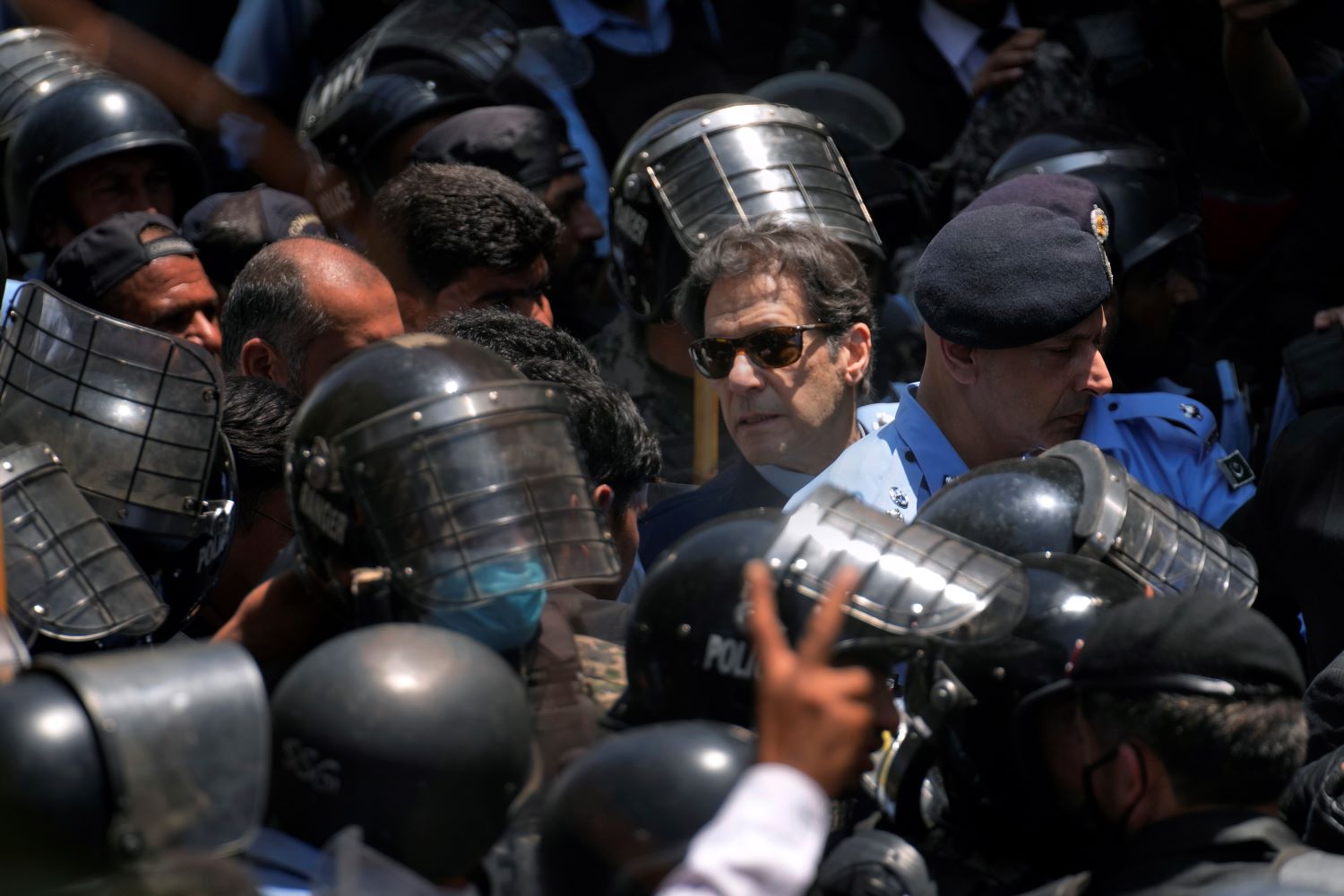
Over the next few hours, as I watched from the safety of my phone screen, mass protests and roadblocks began to choke almost every major city. As I read through each WhatsApp message, it added a new piece to the political puzzle - a tumultuous series of events that rocked the entire country into a warzone. The streets began to echo with the sounds of violence and the air was thick with tension and fear.
Protesters unleashed chaos nationwide, targeting not just military buildings and state assets but even the corps commander's residence in Lahore, leaving a long-lasting trail of destruction in their wake. Cars and buses were set ablaze, casting an ominous glow over the already tense atmosphere. The entire transportation system came to a standstill, while markets and educational institutions were forced to close. As the crisis deepened, the world of finance was in turmoil, with gold prices soaring to yet another unprecedented height and sterling reaching a one-year peak.
My homeland - burning with violence
As a journalist, I felt an urgent need to express my thoughts and observations on the rapidly unfolding events since they were taking place during my presence in the country. I took to my Instagram story, sharing the video of the arrest, along with a caption that not only reported the situation but also revealed my perspective as a member of the Pakistani diaspora who had returned to her homeland only to see it burning with violence.
But before long, my status disappeared from view without warning, as if my voice had been muted. Was it a technical glitch, or was there an intentional effort to silence my reporting? Was my account going to be suspended? It made me realise the extent of censorship and limitations on freedom of speech in my own country.
As journalists, how can we navigate these challenges and ensure that our reporting and commentary remain accessible to our audiences? As I was about to post on other social media platforms to share the news, the digital world fell silent, with internet services cut off and social media platforms suspended.
Sameen Daud Khan, a researcher who worked on Pakistan’s Internet Landscape report, published in 2022, told the Geo Television on May 10: "With Pakistan already ranking among the world's worst countries in terms of Internet access, Tuesday's [May 9] outage was nothing short of a shambolic turn of events. It is unfortunate that whenever the political climate in the country heats up, such a measure is viewed to be a necessity, when in truth it robs the people of the fundamental right of access to information that is guaranteed by law.”
On the other hand, with some slow access to Wi-Fi only, Khan's party, Pakistan Tehreek-e-Insaf, took to its official Instagram page and posted a message urging their supporters to use a VPN (a virtual private network) for Pakistan in light of the suspensions imposed on Twitter, Facebook and YouTube.
Umar Burney, a 34-year-old news reporter at Dawn News, had a lighthearted take on the situation, saying: "Social media suspension can't really affect much because one thing every Pakistani kid learns when he steps into adulthood is how to use a VPN for obvious reasons."
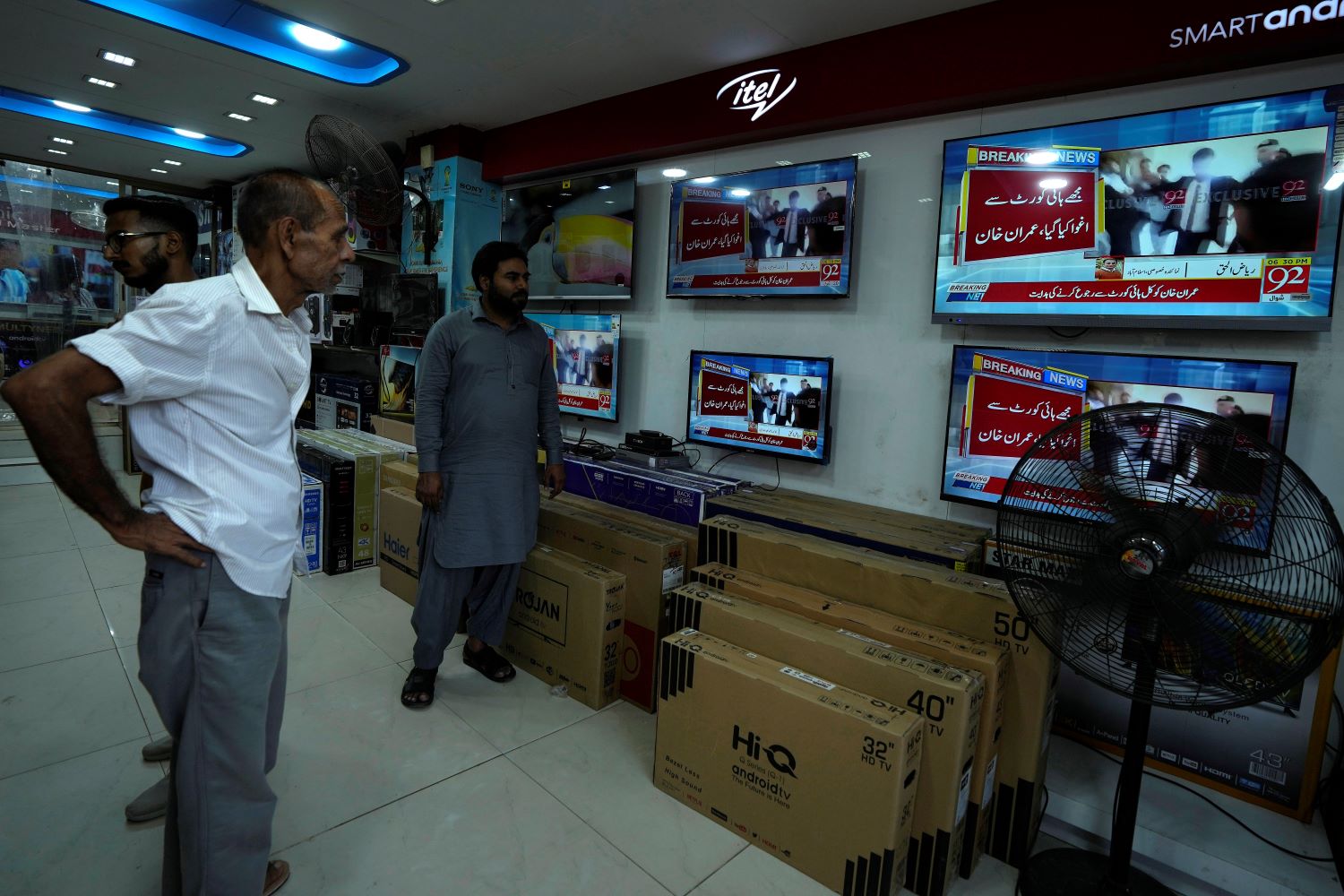
Despite this, not everyone is tech-savvy enough to overcome the suspensions.
At this moment, reporting in Pakistan means ensuring the availability of necessities, such as internet connectivity, before even starting to think about the story at hand.
Fortunately, telephone lines have remained functional, serving as a potential lifeline for communication and updates regarding the situation. I called a family friend, aged 65, living in a high-rise apartment along Karachi's bustling Shahra-e-Faisal road, where police were firing tear gas shells and using batons against thousands of PTI supporters. I received an account of the disturbing scenes observed from her window:
"The protestors have set cars and buses on fire. I can see the flames and smoke from my window. They are using force against the police, who are responding with tear gas" - a toxic substance that can cause lung damage - into crowds. As the night progressed, tear gas seeped inside her own house. "I've tightly shut all the windows and doors, placed wet towels and ice next to me for my eyes," she said.
"I'm grateful for my timing," she told me, “as I had done my grocery shopping earlier this morning before the arrest took place. At least now, I won't have to go outside."
In the midst of road blockages, even the simplest of tasks become frustrating challenges. The process of ordering groceries and food is fraught with difficulties, because of disrupted Wi-Fi signals, while for the delivery riders, it is a struggle to find my address in the absence of the internet and a navigation map. I may have had to wait an hour and a half, but I'm still impressed by businesses like Cheetay Grocery Store, which continued to deliver their services through phone calls, despite the challenges.
No internet means navigating Lahore has become challenging for me too, as I have grown reliant on digital maps and directions. Instead, I have to make phone calls and use nearby shops as reference points to navigate. Even familiar street corners considered safe require a second thought before travelling to them. As I drove past Lahore's Khayaban-e-Firdousi on May 9, I observed a group of young men attempting to block nearby roads using their motorbikes, bricks and rocks, near the Shaukat Khanum Hospital, founded by Imran Khan. The hospital looked calm, but there was a sense of unease in the air. It appeared that a protest was about to begin.
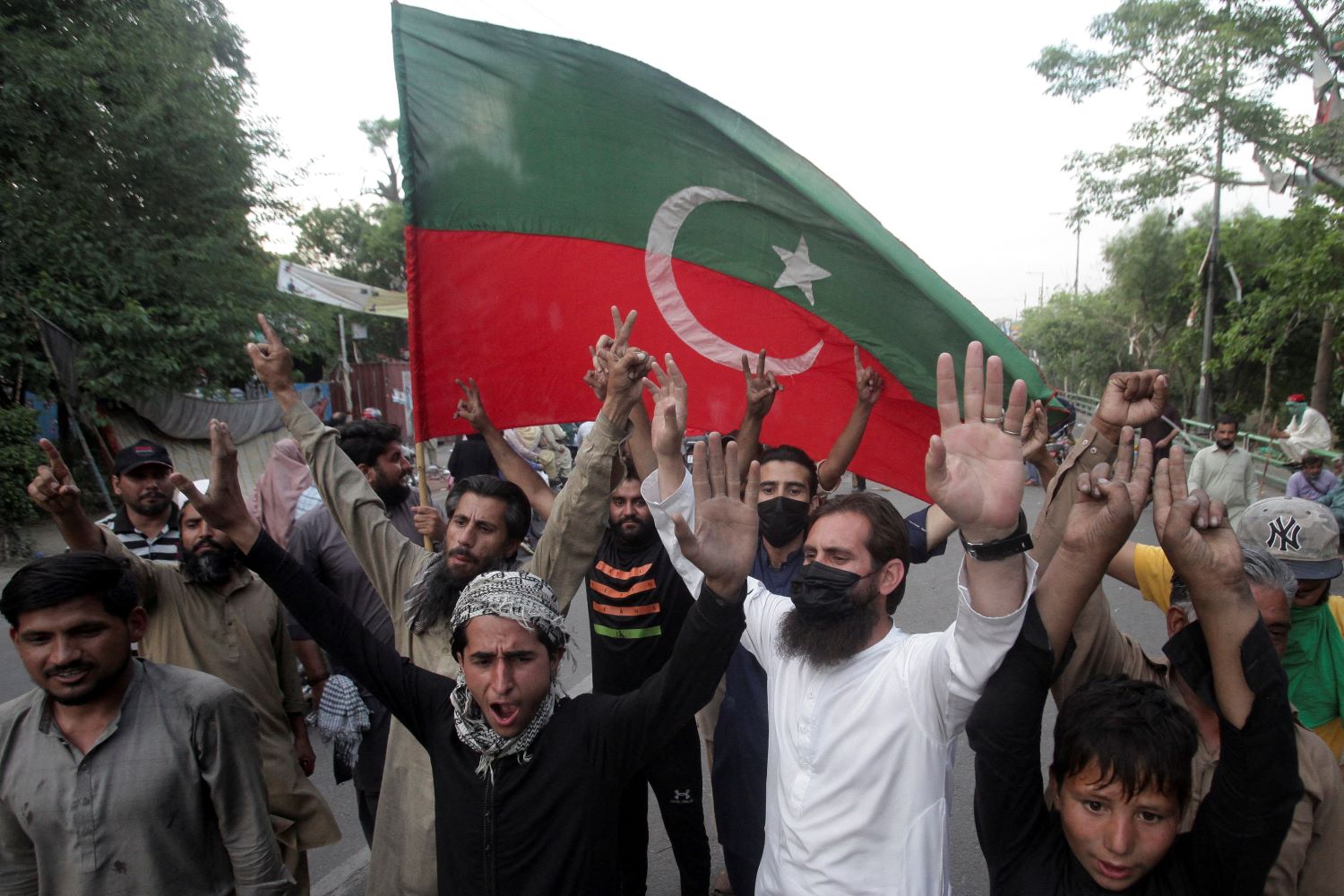
Being a journalist from the Pakistani diaspora based in the UK, who is often considered an outsider, it has often been daunting for me to leave the safety of my car and report on or document what is happening around me. This feeling has only grown stronger, particularly after I came across the disturbing news of a mother and her daughter, both of British-Pakistani origin, being violently mistreated by the female Pakistani police. The incident, captured on video, revealed how the women were arrested during a peaceful protest without apparent provocation and were dragged into a police van. Throughout, they repeatedly exclaimed: "We will call the British Embassy. How can they treat overseas Pakistanis like this?"
On the evening of May 9, the UK Foreign and Commonwealth Office issued an updated travel advisory, warning travellers to Pakistan of political rallies that could "turn violent". The imposition of Section 144, which prohibits public gatherings of more than four people, was also enforced as a response to the rising unrest and as a measure to uphold law and order following reports of violent protests from various regions of the country. This situation has served as a reminder of the risks associated with reporting for journalists in such an unstable scenario.
‘It feels like covering a warzone’
As local journalists in Pakistan set off to report the truth, they have encountered escalating difficulties and dangers at every turn in the increasingly fraught environment following Khan's detention. Drawing on my connections and insider knowledge, I have been able to gather a series of accounts from several Pakistani journalists, recounting their experiences.
Talha Saeed, a 31-year-old reporter for the local Pakistani channel Hum Network News, says: "With every passing day, reporting becomes more difficult. It feels like covering a war zone, especially after the arrest of former Prime Minister Imran Khan."
"To ensure safety, we use protective gear like helmets and gas masks to avoid tear gas. While doing field coverage, we try to maintain a safe distance from the crowd," he adds.
"Internet blockades are very much disturbing the pace of our work. We used to send footage from the spots mostly via WhatsApp. It is also getting difficult to contact our sources. Journalists play an important role in promoting accountability and transparency during such times. My advice for every journalist is to be unbiased, especially under such circumstances, to ensure their credibility," he concludes.
Live, from-the-ground reporting journalists like Saeed are constantly facing a changing and unpredictable landscape, where they must prioritise accurate reporting while also ensuring their own safety. Despite these challenges, Saeed is committed to giving a voice to the people in the midst of political unrest and military conflict. Yet, balancing the need for accurate reporting with their own safety can be a challenging task for journalists, and it requires a high degree of professionalism and expertise.
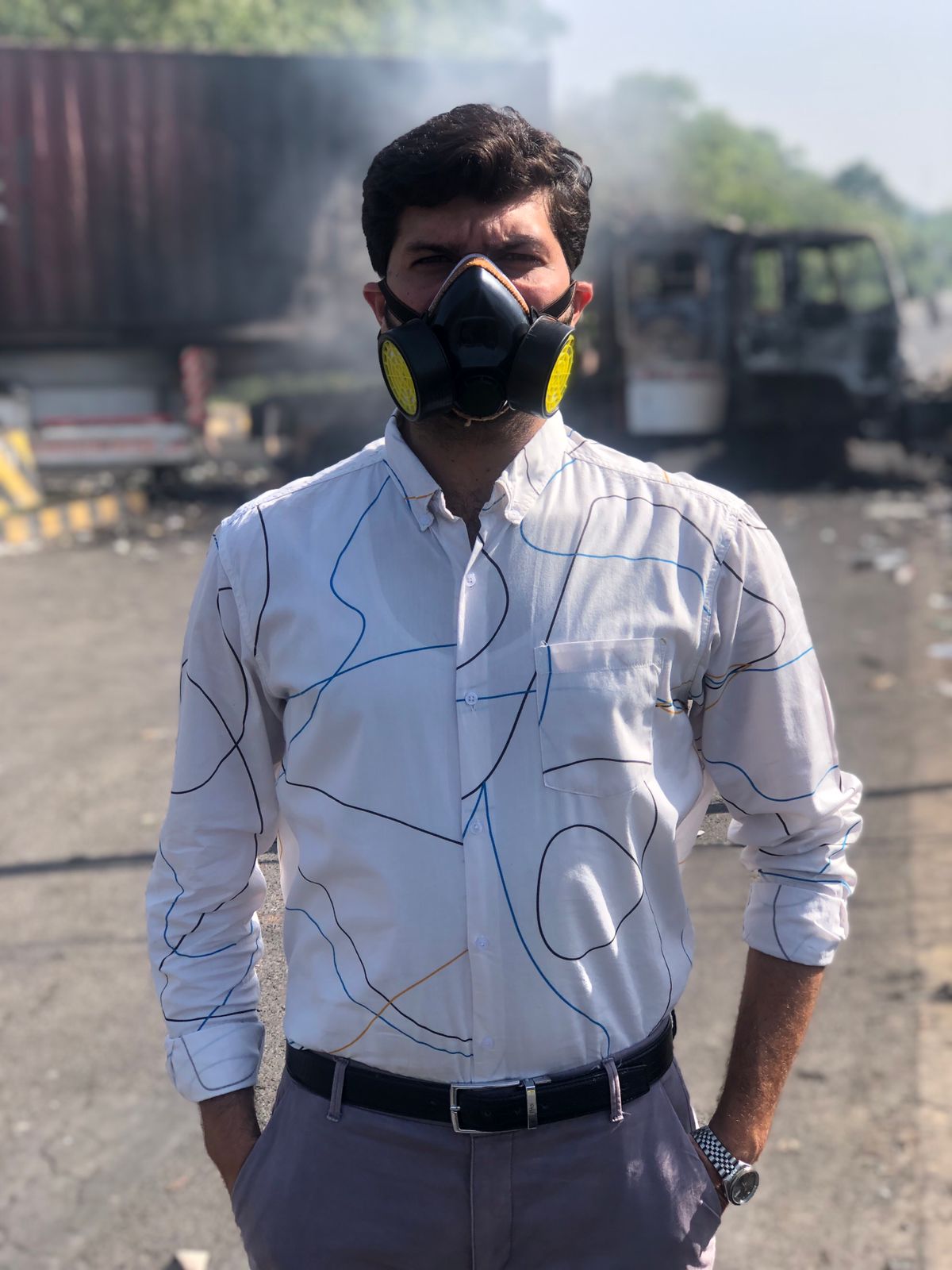
Pervaiz Jamil Mir, commonly known as PJ Mir, is a respected senior journalist and a prominent anchor in the Pakistani media, widely recognised for his insightful and hard-hitting interviews of politicians. His work has had a significant impact on the media industry, and he continues to inspire the younger generation of journalists to pursue their passion for truth and accuracy. He tells me that during times like these: "The role of any journalist has to be straight and objective. Some Journalists in Pakistan become party to the issues, and they are ones who create negative perceptions, if you really report the truth the whole truth it works both ways, national security cannot be compromised while the other side sees mixed reports."
Mir is hopeful. "It is, however, getting better. Responsible reporting is there with exceptions, but it will take time to get journalism on the right track."
Mir has always emphasised the importance of impartial and responsible journalism, and advocated for the protection of media freedoms in Pakistan. By doing so, he has helped to shape the next generation of journalists in the country.
With a similar perspective, Sibte Arif, a 42-year-old journalist from Geo News, shares the following: "Despite the dangerous situation, we still have to report the news, provide a balanced view, and keep objectivity in focus so that information can be conveyed accurately.
"However, live reporting is becoming increasingly challenging during this time, as words can be easily misconstrued. It's better to write key points beforehand, especially in these sensitive situations."
However, the Dawn News reporter, Umar Burney, notes that: "Accountability and transparency are not possible in a political unrest."
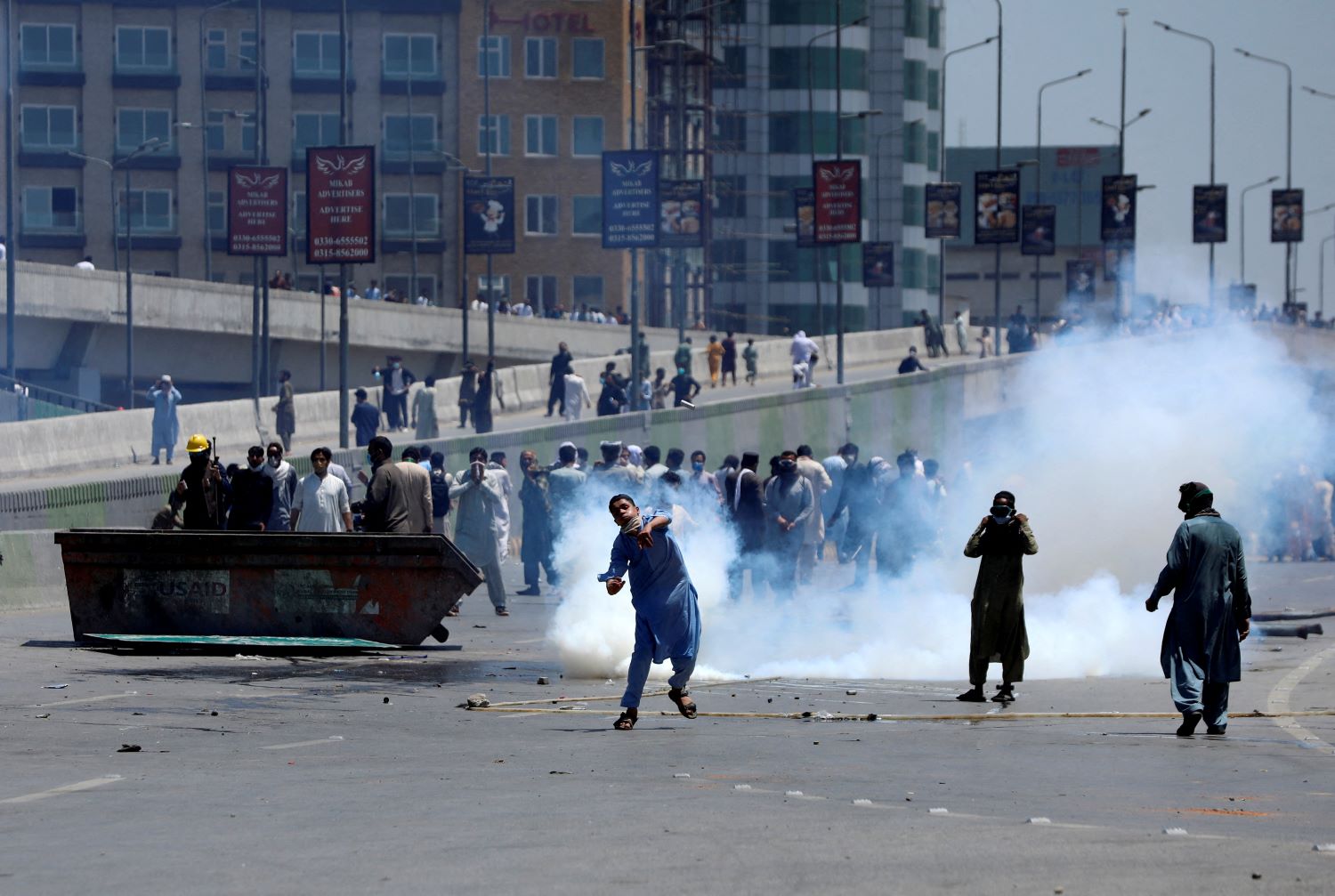
Polarisation of the media
"Political reporting in Pakistan has faced numerous challenges since 2012 due to the huge media divide. This divide has led to a situation where political parties are intolerant of one another," says Arif.
The political media divide refers to the polarisation and bias in media coverage towards a certain political party or ideology, which often leads to the creation of different media factions and a lack of impartiality in reporting. In Pakistan, the political media divide refers to the situation where certain media channels are aligned with particular political parties or personalities, which leads to a lack of balanced reporting.
This, Arif adds, leads to "political mobs being a constant source of disturbance for us. As a result, many journalists remove their channel logos from their microphones while reporting. It's a tough time".
Zarghoon Shah, 40, a correspondent at Geo Television, offers a different perspective: "If your media house is neutral and has no tags or tilts on sympathies for any political party or a national institution, you can cover the events without fear."
Regardless of their political stance, the risk of violence and harassment is ever-present for female journalists in Pakistan. Nevertheless, they remain steadfast in their commitment to deliver truthful and reliable news to the public.
Considering the events that occurred after the arrest, Naila Ali, a 27-year-old female anchor at GNN News, points out that, "During political chaos, field reporting is a very difficult task, in particular, if the journalist is a female.
"We avoid areas where there is a risk of violence, but we continue to report. Our priority is to protect our lives, and once we feel safe, we report what we witness with good intentions.
"I have always believed that instead of sensationalism, the authenticity of the news is most important. It's crucial to convey the ground realities to the audiences. To achieve this, I carry out a detailed Q&A session with as many people and sources as possible on-ground, to find out what the reality is."
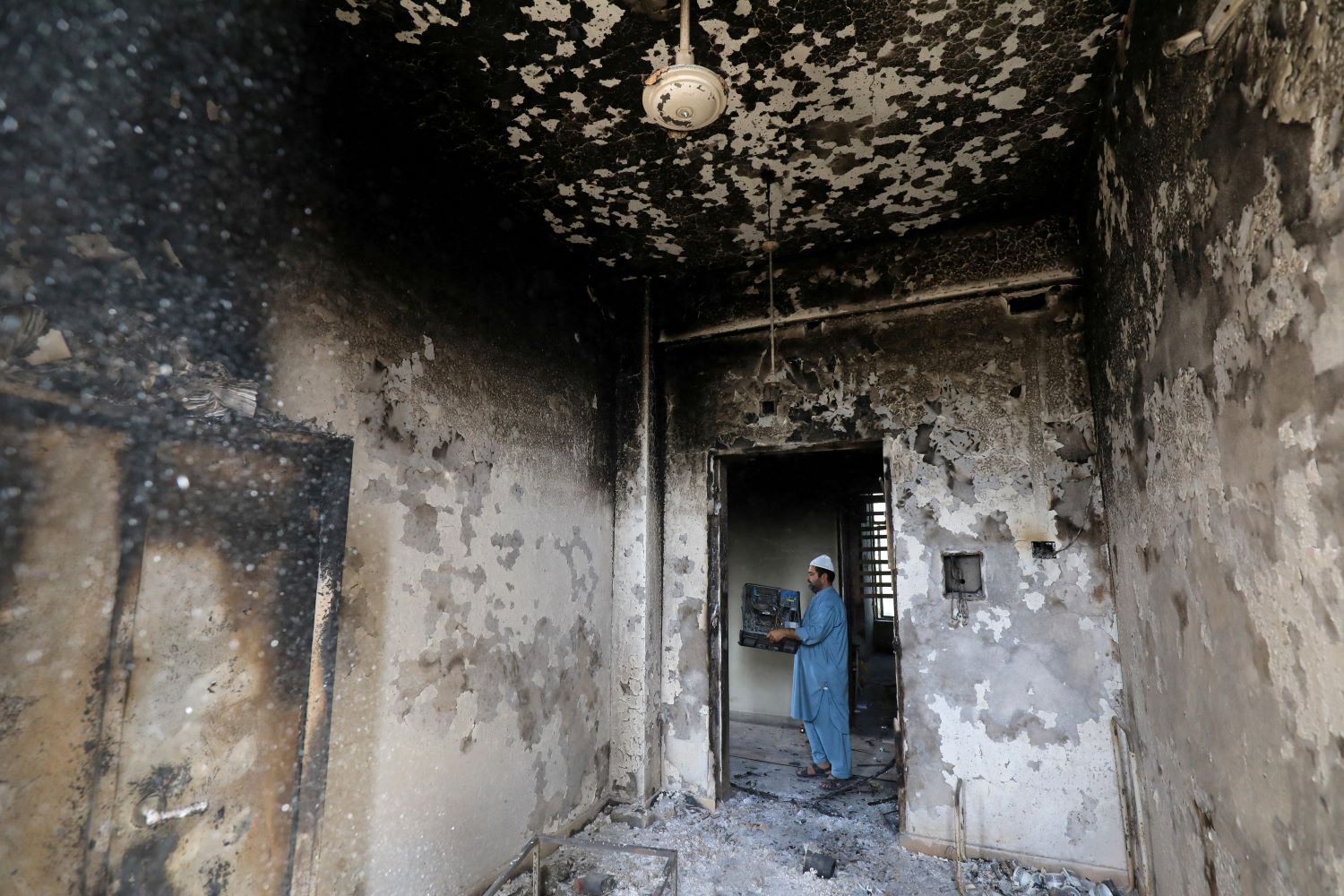
For some journalists in Pakistan, however, navigating these tumultuous events has become a routine part of their work. For Abdul Majid Bhatti, 60, a veteran journalist from the Jang Media Group in Karachi, political turmoil and violent protests in Pakistan are nothing new. "This political crisis in Pakistan is normal,” he says. “Pakistani journalists are used to this. We've seen it all before," he says. "Every few years, there seems to be some kind of crisis or unrest. We've had cinemas burned down, and there have been widespread protests following the assassination of Benazir Bhutto."
Bhatti's perspective serves as a reminder of the resilience of the Pakistani people and the steadfast dedication of journalists to their profession, even in the face of adversity.
On transparency and accountability in journalism, he says: "While there are some very good journalists and major media houses, like Dawn Group and Jang, who still follow ethical standards, the ultimate decision-making power lies with the owners' policies."
Reporting on Pakistan comes with very specific risks
He also emphasises that journalists in Pakistan must take responsibility for their safety in dangerous situations. "While some news channels, such as Geo News, provide their reporters with insurance coverage, bulletproof jackets, and masks for tear gas, they also advise that whenever you report, be careful. Cross-firing incidents do take place in Pakistan, and unfortunately, reporters do get injured. While such situations may be rare in Europe or the UK, they are all too common in Pakistan, making the job of a television reporter difficult and risky when reporting live from the scene, compared to those in the print media."
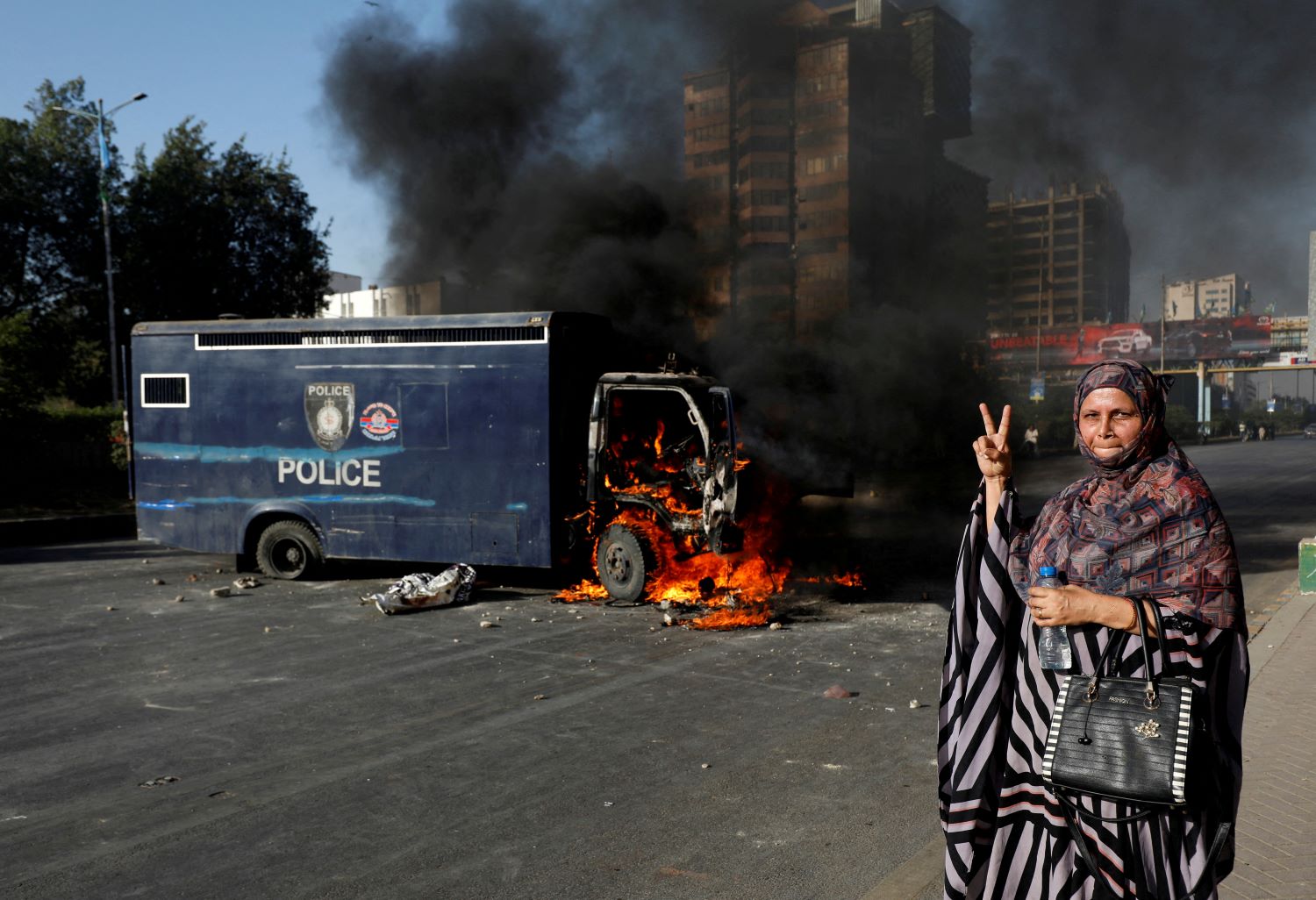
According to Azam Khan, a BBC Urdu journalist, ensuring the safety and security of journalists is a major concern during these times. "We have deployed our reporting team in safe zones, ensuring safety kits for them. For the protection of sources, we are also not disclosing their identity and not quoting anything from those officials who are deputed in the field."
Nevertheless, even with these precautions, the situation remains dangerous. Arslan Javaid, a 29-year-old journalist from Neo News, recounts a harrowing incident following the arrest of Imran Khan. "The Punjab Police prevented us from documenting their actions. Our cameras, phones, and other reporting equipment were confiscated [on May 9, 2023]. Even when we attempted to approach the protesters, we faced similar treatment. They accused us of reporting inaccuracies, with direct curses and shouts our way. It's not just the protesters, but regular people who are attacking us."
Describing another alarming event from the following day, on May 10, he recounts standing at Lahore's Kalma Chowk Flyover, where he was almost assaulted by protesters and was compelled to depart to ensure his safety.
International press - an easier ride?
He explains that for safety reasons, "sometimes we had to conceal our identity and reveal our true identity at other times". Interestingly, he explains, "when we had sufficient protective gear like bulletproof jackets, helmets, and masks, we were perceived as international journalists and protesters were more cautious as they thought they were being depicted on a global platform. Even the police never said anything.
"The normal field reporter, with a Pakistani journalism style, is mistreated from both ends. It's a risky situation. Sometimes, to avoid being attacked by protestors, we had to pretend to be with them and not affiliated with the media."
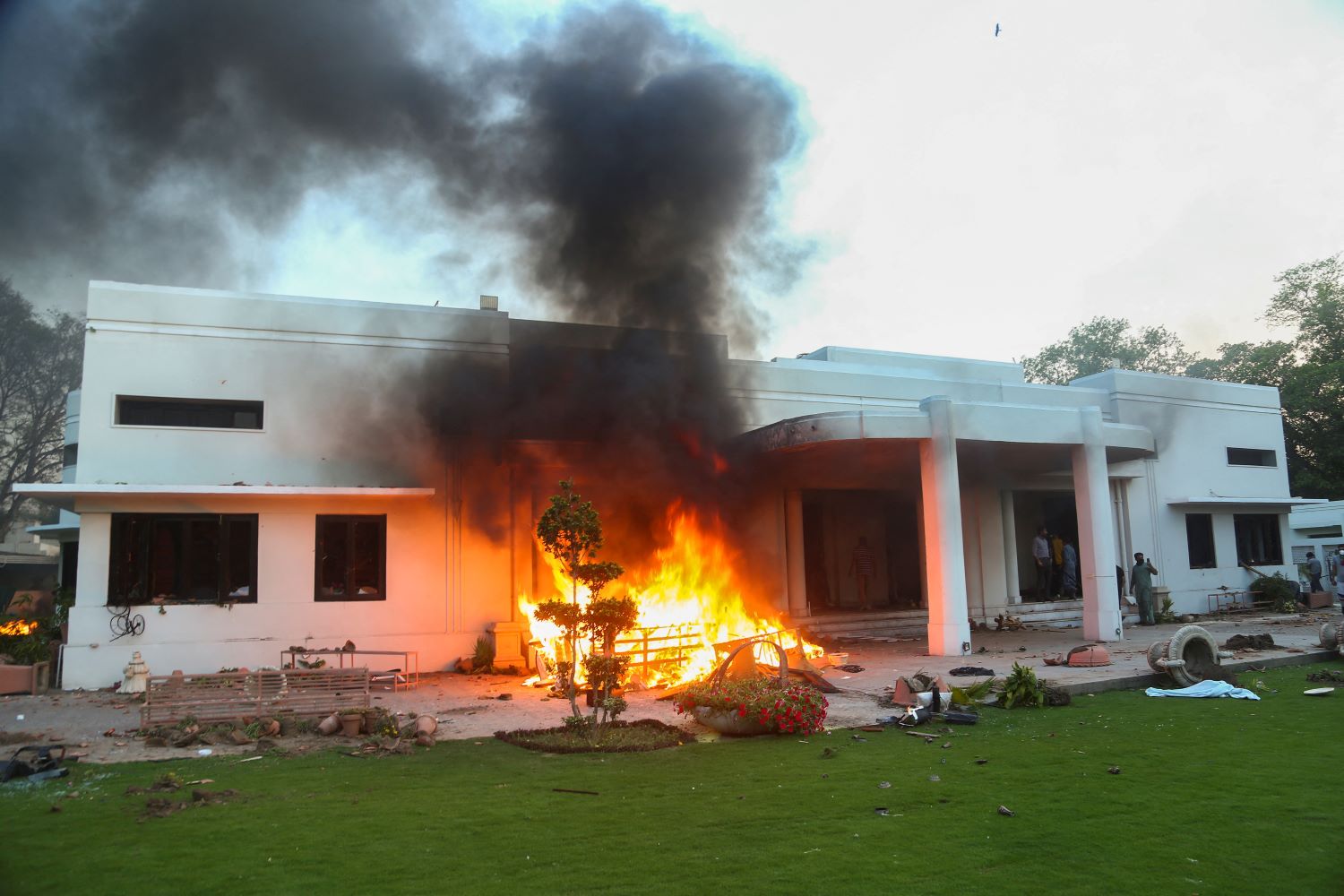
Arslan Javaid also comments on the internet blackouts and political media divide, stating: "Without any online connectivity, we are left with no options. We have to gather data and then travel back to the office to drop it off, and then, back to the field again."
"The political media divide has made it increasingly difficult for field journalists to perform their duties. While their job is to report unbiased news, those in charge of the television channels often impose their own policies, without understanding the on-the-ground realities. This creates problems for us reporters, who are expected to follow the television rules and report accordingly. As a result, media workers are harassed. In the current Imran Khan situation, journalism in Pakistan has become very unsafe. For the aspiring journalists," he notes, "what you are taught in the classroom is often opposite to what is practised in the field."
Every journalist my contacts introduced me to had a story to tell and each story taught me to look beyond the surface-level news and understand the complex challenges faced by reporters on the ground in Pakistan. These journalists show immense courage and determination to continue their work despite the risks. Their experiences also highlight the urgent need for better protection, support and assistance for journalists operating in high-risk environments.
As I walked through our local neighbourhood market in Lahore to fetch some basic necessities after dinner on May 10, I couldn't help but notice the heavy atmosphere of tension and frustration that hung in the air. With children out of school and parents out of work, the community is on edge. The current political and social unrest in Pakistan had cast a shadow of uncertainty over the country.
But one thing is certain, the coming days and weeks will test the resilience of Pakistan and its people.
